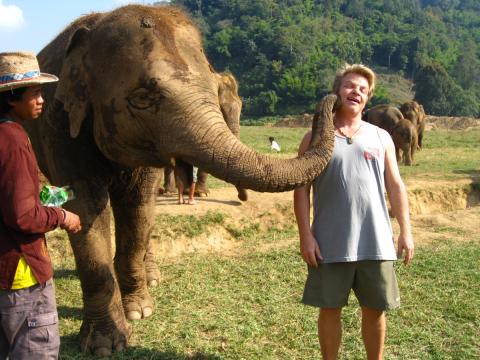
Originally founded in the 1996, Lek's park has become a loving home to, at last count, 34 elephants. Almost all of the elephants at the park have been rescued from either abuse, neglect or, worst of all, downsizing, the tour guide, an equally petite young Thai woman, explains to the group of visitors this January day. She says traditionally elephants were used in Thailand's logging industry, but after a logging ban enacted in 1989, these working elephants became liabilities and were often sold into the tourist trade or just let loose. And while an elephant in the tourist trade may only have to contend with a certain loss of dignity, a fully grown elephant roaming an inhabited countryside quickly becomes a pest and is dealt with as such. Of the many elephants taken into the park over the years one was blinded, one lost a tusk to poachers, one lost a foot to a land mine, and 2 were orphaned, she says. However, since it's founding the park has recorded seven births. No history of abuse for those big babies.
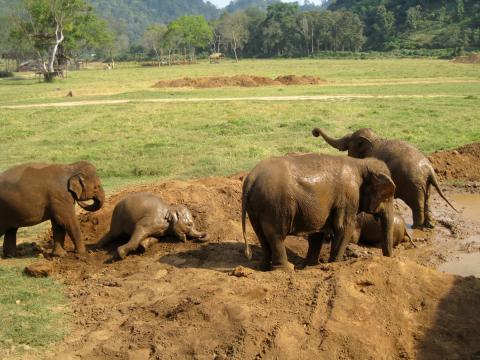
Now, more than a decade later, her Elephant Nature Park is a leader in the small but burgeoning ethical ecotourism industry in Thailand. Its growing reputation stems from the fact that this park offers something unique to visitors — a chance to see these magnificent animals close up, and to engage with them free from chains, or saddles, or bars on a cage. Visitors are encouraged to hand feed the elephants, to bathe them in the nearby creek, to pat their leathery prickly hides, and then to watch them cavort in the mud as they take their afternoon "dirt bath." It is an unforgettable day trip for many travelers and the number of repeat guests this park receives testifies to the quality of the experience. In this tour group alone, one Dutch woman says she's been to the park three times over the years, and upon our arrival at the compound she greets several other "veterans" who are also return visitors.
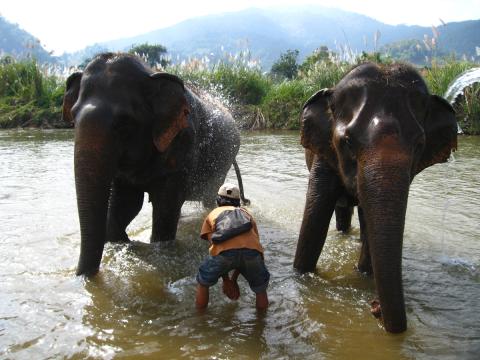
The Elephant Nature Park operates as a non-profit organization, and although revenue is generated by the new and repeat tourists, there's always a need for a little bit more coin in the coffers. That's why the park website has set up a sponsorship program which allows internet visitors to foster or adopt an individual member of the herd, buy him or her some important medical supplies, or even just buy them an elephant-sized lunch for a modest 10 bucks. Feeding more than two-dozen wild elephants isn't cheap, as a fully grown Asian elephant can eat up to 250 kilograms of food a day, so that $10 goes a long way.
Another incentive, that generates much needed revenue, is the park's volunteer program. This program offers those who want to more fully immerse themselves in this magical elephant world a chance to go the extra step and stay for one night, or up to two weeks, in the park's guest quarters. The cost is modest (about $150 for an overnight stay, including meals) and everyone who does stay overnight is also required to participate in the running of the camp. Whether that means prepping elephant breakfasts, taking one of these gentle giants for a morning constitutional, or just helping with the daily riverside scrub sessions, everyone pitches in and does his or her share. Even the small children, of the families that have built their vacations around coming to the park, lend a hand where needed. And everyone seems only too happy to carry out the chores they are assigned. Each elephant is also cared for individually by a dedicated mahout (a trained Thai elephant handler), who tends to any elephant ailments as well as their feeding and bathing. But overnight visitors can get a bit of hands on mahout experience as well.
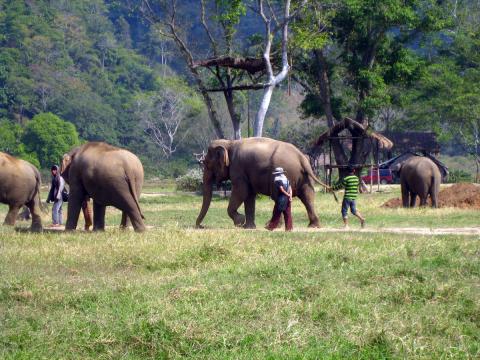
To be fair, this is not the only wildlife park in the area offering an elephant experience. There are many competitors, and in the nearby tourist mecca of downtown Chiang Mai, the adverts in the travel agent kiosks all clamour for a piece of the valuable tourist dollar. But what you won't find at Lek's sanctuary are flashy gimmicks like the dubious "elephant rides" that are promoted at other elephant parks. No doubt the idea of riding one of the largest land mammals on the planet is pretty enticing to the average tourist, but the experience at the Elephant Nature Park is about respect, and not about servitude. After all, most of these animals have been through enough. And despite all their prior rough treatment, these noble beasts are gracious and gentle with the passing parade of trekkers that file through the park gates day after day. Some lucky guests are even treated to an "elephant trunk kiss," which is much like having a sticky moist vacuum cleaner nozzle pressed against your cheek for a brief second or two.
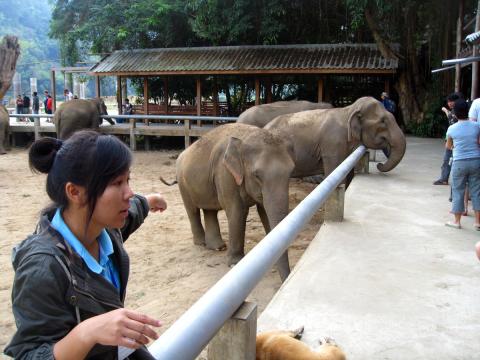
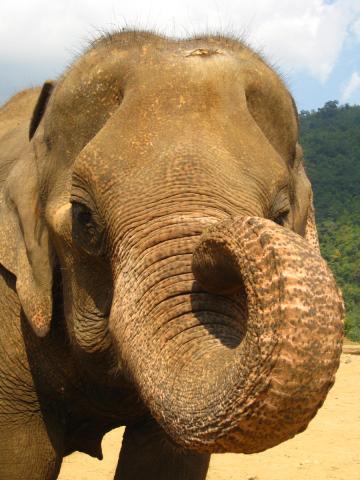
"I am glad to have the chance to encourage the preservation of my local culture and play a part in keeping this precious creature alive," Lek explains as part of her website mission statement. "There are real and extremely serious problems ahead for the Asian Elephant and I hope that I can impress upon you the importance of projects like mine."
Look any member of her happy herd in its big brown eye and you'll see in an instant the importance of her project.
Bruce Scott is a Canadian currently living in Thailand.
Nike Shoes